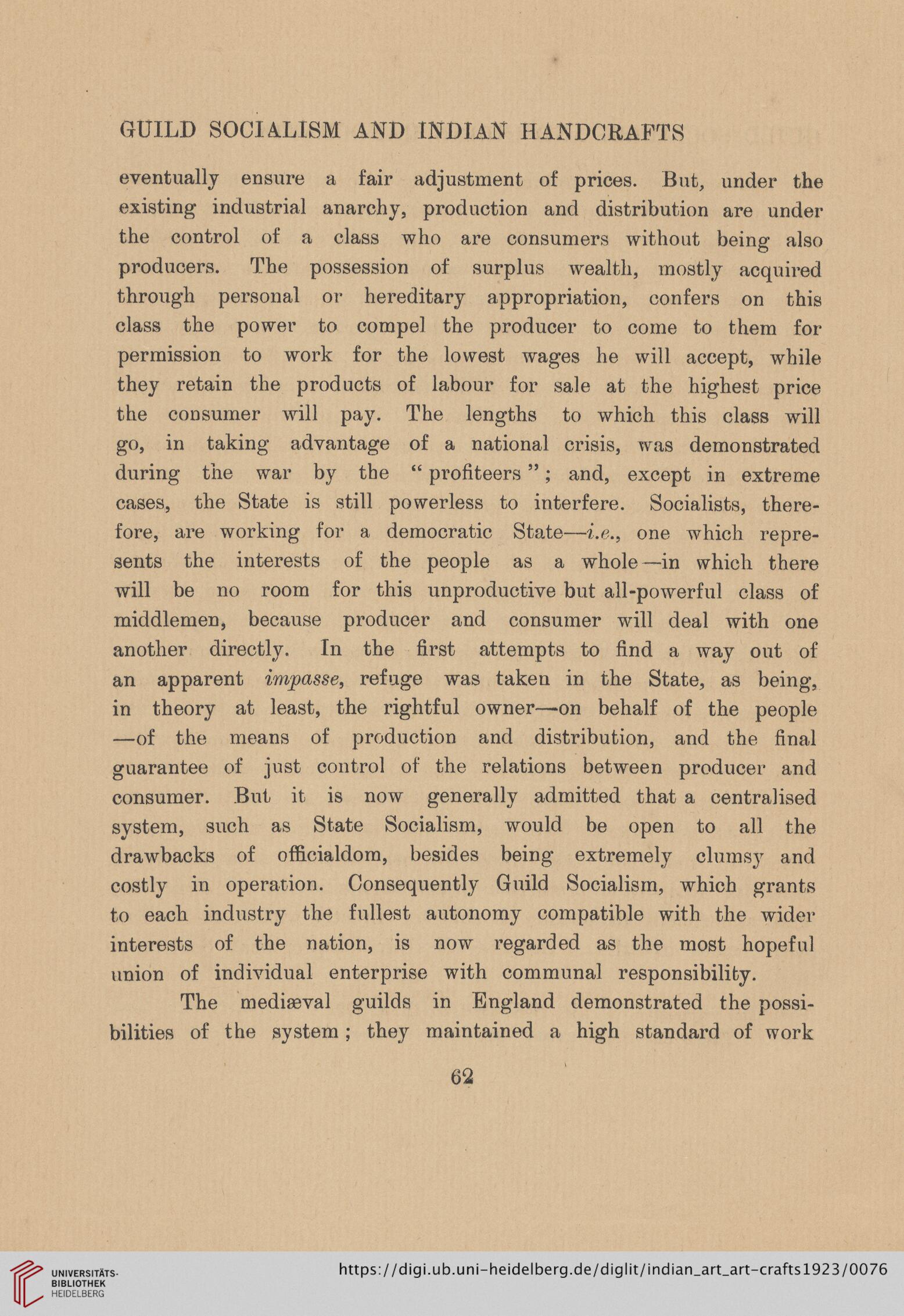GUILD SOCIALISM AND INDIAN HANDCRAFTS
eventually ensure a fair adjustment of prices. But, under the
existing industrial anarchy, production and distribution are under
the control of a class who are consumers without being also
producers. The possession of surplus wealth, mostly acquired
through personal or hereditary appropriation, confers on this
class the power to compel the producer to come to them for
permission to work for the lowest wages he will accept, while
they retain the products of labour for sale at the highest price
the consumer will pay. The lengths to which this class will
go, in taking advantage of a national crisis, was demonstrated
during the war by the “ profiteers ”; and, except in extreme
cases, the State is still powerless to interfere. Socialists, there-
fore, are working for a democratic State—i.e., one which repre-
sents the interests of the people as a whole—in which there
will be no room for this unproductive but all-powerful class of
middlemen, because producer and consumer will deal with one
another directly. In the first attempts to find a way out of
an apparent impasse, refuge was taken in the State, as being,
in theory at least, the rightful owner—on behalf of the people
—of the means of production and distribution, and the final
guarantee of just control of the relations between producer and
consumer. But it is now generally admitted that a centralised
system, such as State Socialism, would be open to all the
drawbacks of officialdom, besides being extremely clumsy and
costly in operation. Consequently Guild Socialism, which grants
to each industry the fullest autonomy compatible with the wider
interests of the nation, is now regarded as the most hopeful
union of individual enterprise with communal responsibility.
The mediaeval guilds in England demonstrated the possi-
bilities of the system ; they maintained a high standard of work
62
eventually ensure a fair adjustment of prices. But, under the
existing industrial anarchy, production and distribution are under
the control of a class who are consumers without being also
producers. The possession of surplus wealth, mostly acquired
through personal or hereditary appropriation, confers on this
class the power to compel the producer to come to them for
permission to work for the lowest wages he will accept, while
they retain the products of labour for sale at the highest price
the consumer will pay. The lengths to which this class will
go, in taking advantage of a national crisis, was demonstrated
during the war by the “ profiteers ”; and, except in extreme
cases, the State is still powerless to interfere. Socialists, there-
fore, are working for a democratic State—i.e., one which repre-
sents the interests of the people as a whole—in which there
will be no room for this unproductive but all-powerful class of
middlemen, because producer and consumer will deal with one
another directly. In the first attempts to find a way out of
an apparent impasse, refuge was taken in the State, as being,
in theory at least, the rightful owner—on behalf of the people
—of the means of production and distribution, and the final
guarantee of just control of the relations between producer and
consumer. But it is now generally admitted that a centralised
system, such as State Socialism, would be open to all the
drawbacks of officialdom, besides being extremely clumsy and
costly in operation. Consequently Guild Socialism, which grants
to each industry the fullest autonomy compatible with the wider
interests of the nation, is now regarded as the most hopeful
union of individual enterprise with communal responsibility.
The mediaeval guilds in England demonstrated the possi-
bilities of the system ; they maintained a high standard of work
62




